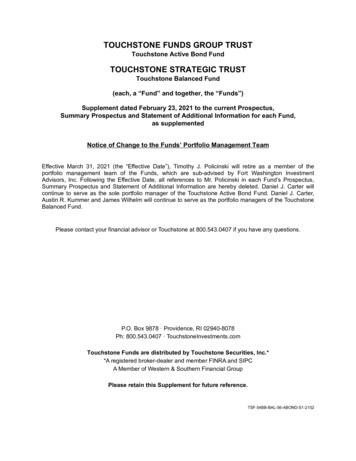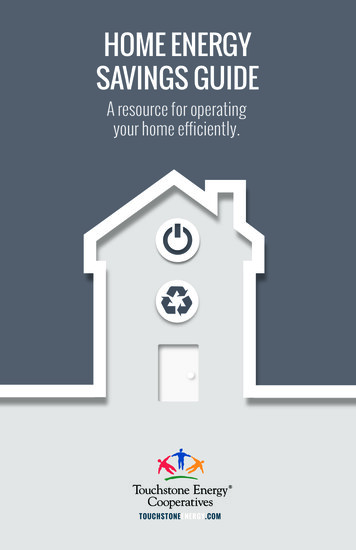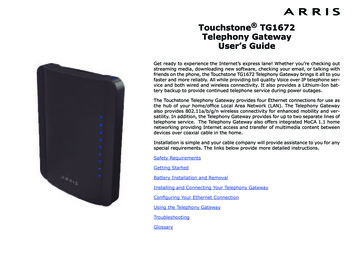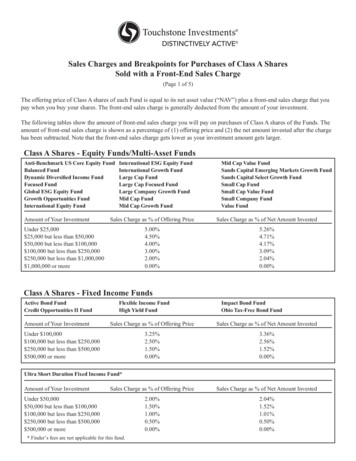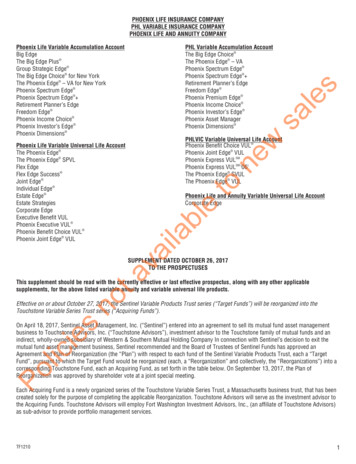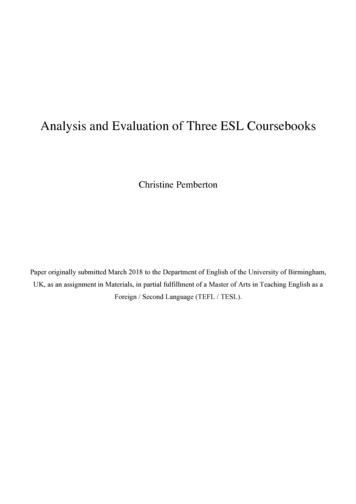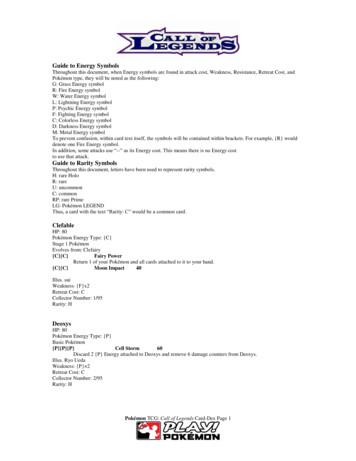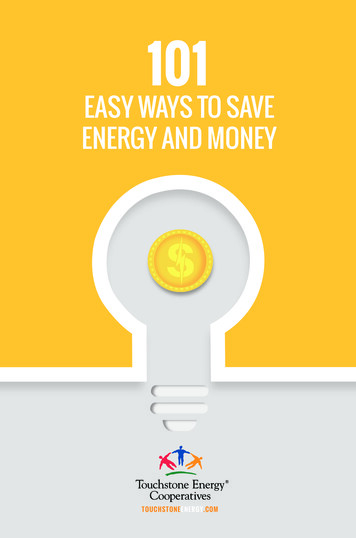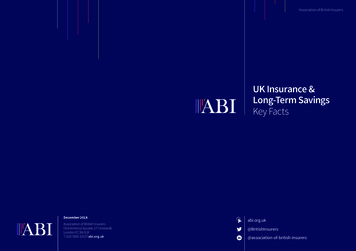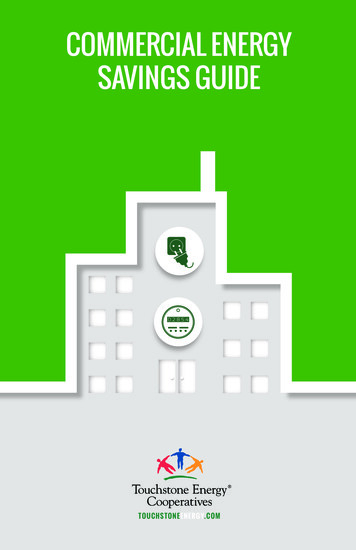
Transcription
COMMERCIAL ENERGYSAVINGS GUIDETOUCHSTONEENERGY.COM
TOUCHSTONEENERGY.COMUSING ENERGY MORE EFFICIENTLYIMPROVES YOUR BOTTOM LINE.Cooperatives and their commercial members share acommon goal: using energy as efficiently as possible.And when it comes to commercial energy, the savingsadd up quickly.So think of your local co-op as your business partner. Yourco-op can improve your bottom line by providing detailson how to save energy, including information on incentives and rebate programs. They also may offer hourlykWh use information. Hourly use data can be very helpfulin evaluating rate options and investment in controls.Touchstone Energy’s Biz Network - also offers advice onhow to make your business more energy efficient.Whether you lease or own your facility, these ten tips canhelp you save energy and money.
TIP #1 - DO THE SIMPLE THINGSFIRSTThere are numerous no-cost and low-cost ways to save energy.Here are just a few: Turn off lights and office equipment at night and when not in use. Keep windows and doors closed to prevent air loss. Check for proper insulation throughout the building. Clean and replace light fixtures with LEDs. Regularly clean or replace the filters in your heating and cooling system. Adjust HVAC temperature settings. Changing one degree can reduceheating and cooling costs by 2- to 4-percent. Consider Wi-Fi smartthermostats for greater control.TIP #2 - CHECK YOUR RATE Review your usage pattern. Adjustments in operation can result insavings on your utility bill. The time of day you use power can affectyour bill.Contact your local Touchstone Energy cooperative for information onavailable rates.
TIP #3 - REVIEW INDOORLIGHTING USE Turn off lights in unoccupied areas of the building.Turn off display case and other lighting when not in use.Switch from incandescent to compact fluorescent lamps in canisters orrecessed fixtures.Replace fixtures using LEDs and evaluate the savings from replacingT-8 or T-5 fluorescent with LED.Replace metal halide lamps with LED bulbs or fixtures.New LED lighting offers higher efficiency and longer life thanincandescent and fluorescent. Consider switching. Your co-op can keepyou informed on new lighting systems coming to market.Use T-8s and LEDs to light display cases.Use LEDs for exit lighting.Install motion-activated light switches and light fixtures.
TIP #4 - REVIEW OUTDOORLIGHTING USE Consider where Wi-Fi is available at app-based light controls withsunset and hours of operation reprogrammed remotely.Use sun trackers or photocells in conjunction with electronic timers.Replace incandescent lighting with more efficient HID or LED lighting.
TIP #5 - ASSESS PLUG LOADS Use smart power strips to control electronic equipment (including computers) to reduce phantom load.Set timers to turn off equipment - such as coffee makers and watercoolers - when not needed.Utilize computer power management settings.Consolidate multiple servers into a single machine.Install occupancy sensors or timers on vending machines.Use portable heaters or fans wisely: turn them off when you leave theroom.If replacing equipment - such as a refrigerator or computer - purchasean ENERGY STAR - qualified model.
TIP #6 - MAINTAIN THE HVACSYSTEM Keep indoor/outdoor coils clean and change filters regularly.Ensure that the HVAC system’s airflow is correct.Check electrical connections and drive belts.Lubricate motors and blower assemblies.Maintain correct refrigerant charge.Correct duct leakage.Minimize HVAC runtime when facility is closed.Consider variable speed heat pumps and mini-splits forsavings and improved comfort.TIP #7 - VENTILATE PROPERLY Meet OSHA standards for occupancy numbers.Meet ASHRAE Standard 62.1 2016 for indoor air quality andsafety.Kitchens should have adequate air circulation.Evaluate the savings from variable speed vent exhaust hoods.Control make-up air with exhaust.Bathroom ventilators should be off when facility is closed, iflocal codes permit.Ensure make-up air is drawn from an appropriate location, e.g.,don’t pull air from dumpster area.Properly balance make-up air with exhausted air.Check damper positioning and the building envelope’s airtightness; stuck dampers and a leaky building can result inover-ventilation, which wastes energy.
TIP #8 - MAINTAINREFRIGERATION EQUIPMENT Clean refrigeration coils regularly.Keep doors and seals on walk-in units in good repair.Ensure that units are properly charged with refrigerant.Check for ice buildup, which can occur because of air leakage.Ensure that units are defrosting properly.Check temperature settings of refrigerators.Install low-temperature occupancy sensors or timed switches in walk-incoolers and freezers.Evaluate the savings from higher efficiency fans and compressor.
TIP #9 - CHECK WATERHEATING EQUIPMENT Insulate water heaters.Set water heater supply temperature to minimum local requirements.Control water heaters based on periods ofneed during the day.Ensure that water heaters are located tomaximize efficient hot water delivery.Explore opportunities for heat recovery.Ensure re-circulating hot water system isoperating properly. Shut off when not needed.Consider heat pump water heaters for spotcooling and lower operating costs.
TIP #10 - CHECK MOTOROPERATION(FOR MOTORS OPERATING MORE THAN 2,000 HOURS/YEAR) Ensure proper lubrication and operating temperature to maximize motorlife and avoid bearing failure.Rather than rewinding motors of less than 25 hp, replace them withenergy-efficient motors.Size motors for the load.Ensure that no contamination or water is getting into motors.Use an adjustable speed drive for motor-driven equipment.Check for compressed air leaks. Evaluate savings from variable speedair compressors and consider replacing air tools with electric batterypowered tools.
Finally, many electric cooperatives offer energyassessments (audits) that can identify opportunities forusing energy more efficiently. Remember, your localco-op can be your best resource to help your businesssave energy and money.To locate your local Touchstone Energy cooperative visitwww.TouchstoneEnergy.com.NOTES:
For more information visit www.TOUCHSTONEENERGY.com
Contact your local Touchstone Energy cooperative for information on available rates. TIP #2 - CHECK YOUR RATE. TIP #3 - REVIEW INDOOR LIGHTING USE Turn off lights in unoccupied areas of the building. Turn off display
